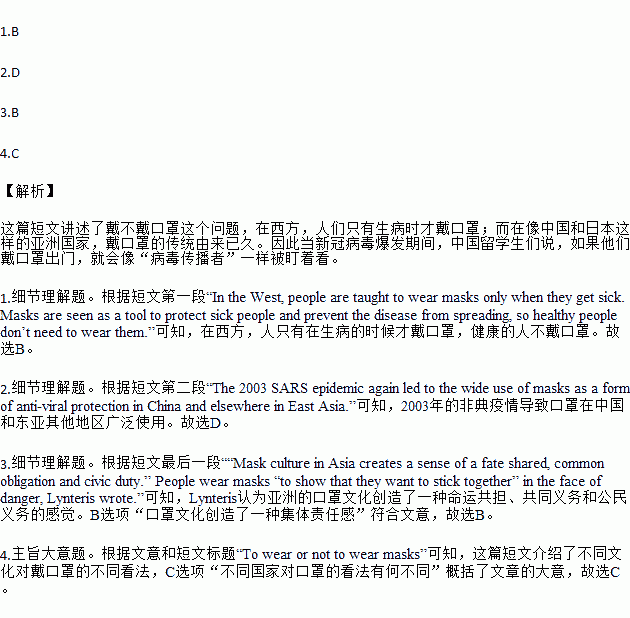题目内容
To wear or not to wear masks?
In the West, people are taught to wear masks only when they get sick. Masks are seen as a tool to protect sick people and prevent the disease from spreading, so healthy people don’t need to wear them. Therefore, during the novel coronavirus outbreak, overseas Chinese students said that they would be “stared at like a virus spreader” if they go out with a mask.
In Asian countries like China and Japan, there has been a long tradition of mask-wearing. In China, for example, when doctor Wu Liande invented the modern medical mask during the pneumonic plague (肺鼠疫) in 1910, the mask became a symbol of China’s position as a modern, scientific nation, according to Scottish medical anthropologist (人类学家) Christos Lynteris. The 2003 SARS epidemic again led to the wide use of masks as a form of anti-viral protection in China and elsewhere in East Asia.
In Japan, wearing masks has long been seen as a manner to reassure others when one catches a cold or flu. Some Japanese also turn masks into fashion accessories (配饰), with different colors and patterns to match their clothes. Wearing masks is also a way to “hide” for young women when they don’t have their makeup on.
In more collectivist cultures in Asia, wearing masks might also be a symbol of solidarity during the outbreak, according to Lynteris. “Mask culture in Asia creates a sense of a fate shared, common obligation and civic duty.” People wear masks “to show that they want to stick together” in the face of danger, Lynteris wrote.
1.Why don't healthy people in the West wear masks?
A.They don't think masks can prevent disease. B.They think masks are for sick people to wear.
C.Only medical workers need to wear masks. D.Wearing a mask looks funny.
2.Masks have been widely used in China since _____.
A.the invention of the modern medical mask B.the pneumonic plague in 1910
C.Christos Lynteris wore one publicly D.the outbreak of SARS in 2003
3.What does Lynteris mean in the last paragraph?
A.People have no sense of duty if they don’t wear masks.
B.Mask culture creates a sense of collective obligation.
C.Asian people are more united in the face of danger.
D.We are a community with a shared future for mankind.
4.The purpose of the story is to _____.
A.explain why Westerners don’t wear masks
B.prove the importance of wearing masks during an epidemic
C.how opinions about masks differ between different countries
D.explain the history of masks

